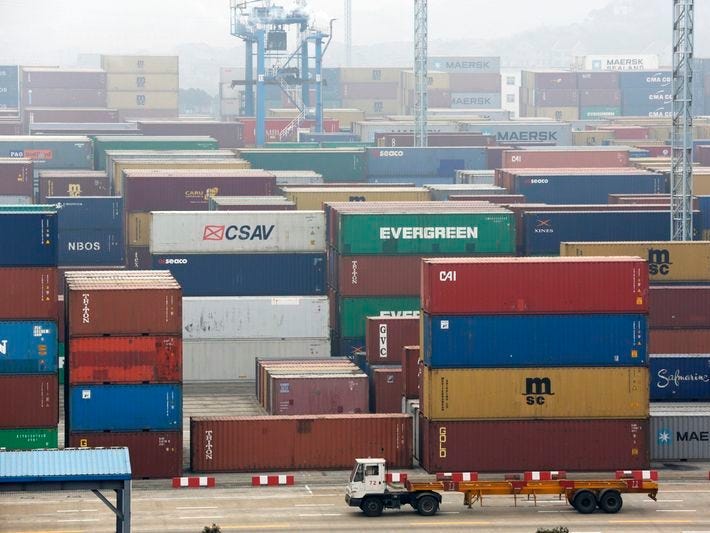
Thomson Reuters
- China shut down a key terminal at its Ningbo-Zhoushan port after a worker came down with COVID-19.
- Experts predict the Delta variant will lead to more port shutdowns in the coming months.
- The shutdowns are set to worsen the shipping crisis, pushing prices and shortages to a new extreme.
- See more stories on Insider's business page.
Just as the global supply chain is beginning to recover, a shutdown at one of the world's busiest ports threatens to tack on extra delays and send commodity prices even higher.
China temporarily closed a crucial terminal at its Ningbo-Zhoushan port – the third-busiest port in the world – after a worker tested positive for COVID-19 on Wednesday.
The nation has a zero-tolerance policy for COVID-19, a stance that Dawn Tiura, CEO of Sourcing Industry Group told CNBC will have "severe" consequences for the global supply chain.
Countries like China have seen a resurgence in coronavirus cases due to the highly contagious nature of the Delta variant, which threatens to dismantle the global economy once more.
"China's 'zero Covid' approach means that officials will prioritise pandemic mitigation over everything else," Nick Marro, the lead of global trade at the Economist Intelligence Unit said in an emailed note. "As long as authorities maintain this 'zero Covid' stance, the risk of sudden disruptions caused by testing or lockdowns will persist, which closely ties any hopes of normalcy to factors like national vaccination timelines."
A Ningbo-Zhoushan Port spokesperson said in a statement on Thursday that all other terminals are operating normally and the port is directing shipping companies to other terminals. They did not specify when the terminal would reopen.
But the partial shutdown comes at a time when shipping rates are already significantly elevated, putting pressure on companies that rely on goods from overseas, and forcing prices for key products like electronics, food, and furniture even higher.
Shipping container rates from China and East Asia to the West and East coasts of the US have jumped over 270% and 220%, respectively, this year, according to the Freightos Baltic global container freight index.
Several key US ports in Southern California are seeing record levels of congestion due to port shutdowns early in the pandemic, paired with an uptick in consumer demand. On Wednesday, 38 container ships were anchored off the coast waiting for a spot to open up to unload at Los Angeles and Long Beach ports, according to data from the Marine Exchange of Southern California.
The Port of Los Angeles saw its volumes dip in June because of a COVID-19 outbreak at the Yantian port in China. The lower import levels add not only to further delays, but will also contribute to increased port congestion when the Chinese ports reopen. A Port of Los Angeles spokesperson told Bloomberg that the location is already preparing for another decline in volume due to the Ningbo-Zhoushan shutdown.
Customers have been seeing the impact of port delays for many months. They are facing rising prices and limited options as commodities become increasingly difficult to obtain and produce due to the transportation snags.
Many companies have been forced to compete for containers and delivery dates. To offset higher transportation costs, major companies like Coca-Cola, Procter & Gamble, as well as General Mills have been forced to pass on the price increase to customers.
As demand for goods continues to rise and is expected to peak ahead of the holiday season, experts say US customers will face even more shortages and even higher prices.
"Inventory levels will be retailers' primary concern as they are faced with the decision to either have limited or no stock of certain items or manage higher costs associated with air shipping goods instead," Mario Ciabarra, CEO of digital analytics firm Quantum Metric, told CNBC.
